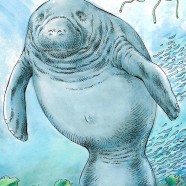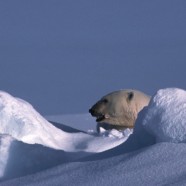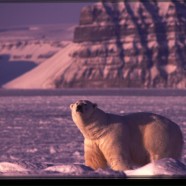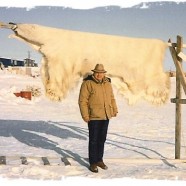The sharks fight back
Convention on International Trade in Endangered Species of Wild Fauna and Flora
CITES 2013 – Bangkok, 17:00 (local time)
Press Release No. 5
Of the 35,000 plant and animal species listed in the CITES* Appendices, only 15 fish will appear in Appendix I and 81 in Appendix II. Fisheries are strategic and political. They must feed humanity while also considering the oceanic territorial claims. Unfortunately, the bluefin tuna has disappeared from all monitors in Bangkok. By contrast, sharks are fighting back with force, accompanied by manta rays.
“Le Beau Mâle,” the perfume that kills
An advertisement for John Paul Gaultier’s new perfume portrays a handsome man with the remains of a polar bear.
Polar bears are at risk of extinction. Hunting is specifically aimed at males. Polar bears are also threatened by the chemical contamination of the Arctic, noise pollution, food scarcity and climatic disturbances.
Of course the authenticity of these polar bear parts for advertising purposes is not guaranteed. But this image encourages a belief in the virtues of charm and virility associated with animal trophies. As CITES – the Convention on International Trade in Endangered Species of Wild Fauna and Flora – has just refused the proposal to transfer polar bears into Appendix I (1), this advertising is poorly timed.
Embargo on the Sirens
Convention on International Trade in Endangered Species of Wild Fauna and Flora
CITES 2013 – Bangkok, 4.45 pm (local time)
Press Release n°4
Caribbean and Amazonian manatees have been listed under Appendix I of CITES since 1975.
It took 38 years for the West African manatee (Trichechus senegalensis) to get the same protection. The proposal from Senegal, Benin, and Sierra Leone was approved by consensus. Today, the population of West African manatees is estimated to be less than 10,000 individuals living in the estuaries and costal waters of 21 countries. Reaching up to 3m in length and between 300 and 500 kg, manatees, also known as sea cows, are exclusively herbivores. Some grand individuals can even reach up to 4m in length and weigh over 1,000kg. Consuming 30kg of aquatic plants each day, they are considered the best biological means of combatting the colonization of invasive species, such as the water hyacinth.
International Trade of Polar Bears to Continue
Convention on International Trade in Endangered Species of Wild Fauna and Flora
CITES 2013 – Bangkok, 12h50 (local time)
Press Release No. 3
The international community, inadequate in stopping the melting of the ice caps, is equally inadequate in protecting polar bears from international trade. The U.S. proposal to add polar bears to Appendix I of CITES was voted down yesterday with only 38 votes for, 42 against, and 46 abstentions (2/3 of the vote were necessary).
The agreement between the U.S. and Russia was not enough. The 27 members of the European Union abstained; they are well situated among the 70 countries that import polar bear hides and skulls each year.
Polar Bears Betrayed by the European Union
In Doha, Qatar in 2010, Europe played a deciding role in the rejection of the American proposal to add Ursus maritimus to Appendix I. Because Europe voted against it, the proposal failed.
In Bangkok, three years later, the E.U. tries again to block the U.S. proposal. Instead of supporting the U.S. proposal, like Russia, the E.U. proposes keeping the polar bear under Appendix II, which authorises the international trade of polar bears and their parts. This compromise suggested by the E.U. is actually more like the status quo. The E.U. presented its proposal several requirements already expressed by specialists, environmental NGOs and certain range states, claiming it would be best to first understand the state of sub-populations, investigate smuggling networks, and to evaluate the effects of the capture and the hunting of the species.
CITES: Over 40 years old and long in the tooth
Convention on International Trade in Endangered Species of Wild Fauna and Flora
CITES 2013 – Bangkok
At its signature 40 years ago, the Convention on International Trade in Endangered Species of Wild Fauna and Flora, was visionary; a fact highlighted by speeches at Bangkok during the opening of its 16 plenary session. Today, it’s falling behind. CITES is disconnected from chemical and radioactive contamination of wildlife, climate change, political chaos and population changes that increase the speed of the extinction of biodiversity.
Is Coca Cola in favour of Polar Bear trade ?
Chairman of the Board and Chief Executive Officer
The Coca-Cola Company
One Coca-Cola Plaza
Atlanta, Georgia 30313
Dear Mr. Chairman Kent,
Robin des Bois is an NGO working for the protection of Man and Environment, based in Paris and has been an observer at CITES, (Convention on International Trade in Endangered Species of Wild Fauna and Flora) since 1988. Fear not, we are not asking for money, we are simply writing to you today with the hope of receiving a response.
We are well aware of the deep-seeded affection your company expresses for polar bears and your interest in their future. With this in mind Coca Cola has established a scientific and economic partnership with WWF. This partnership has raised millions of dollars with the goal of reinforcing efforts towards the protection of polar bears.
A Dark Future for Polar Bears
The hunting of polar bears is now in full force. The Canadian tourist agencies responsible for organizing hunting trips in Nunavut, the North West Territories, and in Manitoba are completely booked until 2014. In order to respond to such high demand, Nunavut increased the hunting quotas in the Hudson Bay area, without taking into account the disapproval of the Polar Bear Specialist Group from the IUCN (International Union for the Conservation of Nature). Instead of the elephant, the polar bear is now the « ultimate target ». The polar bear finds itself in the challenge of the century, at the summit of the world. « For our European Clients, we recommend at least the caliber 8 x 57mm, but the best is 9.3 x 74mm ». Having reached the top, you can return with the most prestigious of trophies, with some help from the best taxidermists in Canada.
Polar Bears: Left Out in the Cold
The polar bear (Ursus maritimus) is a marine mammal that lives off of the other marine mammals inhabiting the artic ice pack, and the surrounding ice flows and ocean. The polar bear is thus an excellent swimmer. The artic ice pack, home of the polar bear, is disappearing. The vulnerability and mortal risks faced by polar bears are increasing.
The polar bear, beloved by many, has become the martyr employed by governments and NGOs to symbolize the fight against global warming. It has become a fundraising symbol and a top-model.
















